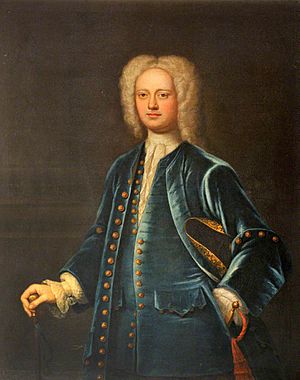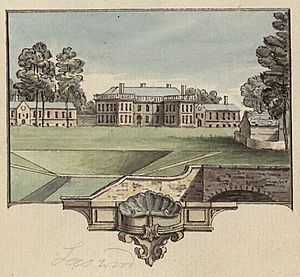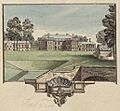Sir George Wynne, 1st Baronet facts for kids
Sir George Wynne, 1st Baronet (born May 1700 – died 5 August 1756) was an important Welsh landowner and politician. He lived at Leeswood Hall in Flintshire, Wales. Sir George was a member of the House of Commons (like today's Parliament) from 1734 to 1742. He was part of the Whig political group.
Contents
Younger Years and Family Life
George Wynne was the oldest son of John Wynne of Leeswood. His first mother was Jane Jones. Sadly, his mother passed away in 1703. His father, who wasn't very wealthy, later married one of their servants, Catherine Jones.
George inherited land in Halkyn, Flintshire, from his mother. This land brought in about £30 a year. In 1720, he married Margaret Lloyd. His father didn't approve because Margaret didn't have much money or a high social standing.
A Big Discovery and Family Trouble
Later, valuable lead was found on the Halkyn land George inherited. This discovery led to a long legal fight with his father. George eventually won control of the land and its mines. Around 1731, his father wrote a public complaint, saying George and his father-in-law had cheated him out of £22,000 a year from the mine.
George spent a lot of money rebuilding and improving Leeswood Hall, his family home. He also served as the High Sheriff of Flintshire from 1722 to 1724. This was an important local role.
His Time as a Politician
Sir George Wynne tried to become a Member of Parliament (MP) for Flint Boroughs in 1727. The election was very close, and his opponent was given the seat.
Joining the Whig Party
George Wynne became a supporter of Robert Walpole, who was a very powerful politician at the time. Wynne worked hard to challenge the strong Tory party in Wales. Because of his efforts, he was given the special title of a baronet in 1731.
In 1734, he finally won the election for Flint Boroughs. This election was very expensive. As an MP, he was dedicated, taking notes during debates and usually voting with the government. Around 1734, he was also made the Constable of Flint Castle, a position he held until 1750.
Financial Struggles and Losing His Seat
Before the 1741 election, Sir George was in serious financial trouble. He had spent too much money, and the income from his lead mines had dropped. He asked Robert Walpole for help, reminding him of how much he had spent fighting the Tories. He was worried he might lose his estate.
He won the election for Flint Boroughs again, but it was another tough contest. He took his seat in the House of Commons. However, his opponent challenged the election results. In 1742, the House of Commons, which now had many members against Walpole, decided that George Wynne should lose his seat.
Later Life and What He Left Behind
Within a year of losing his seat, Sir George Wynne's personal belongings were taken to pay his debts. For a while, he was even held in the King's Bench Prison.
He passed away on 5 August 1756, at his home in Blackheath. He didn't leave a will and had no sons to inherit his title. He was buried at St Margaret's church in Lee.
His only daughter, Margaret, inherited the Leeswood estate. She was married to Richard Hill Waring. However, Margaret also passed away without children in 1793. Sir George's baronet title then passed to his brother, John.
Images for kids
 | Selma Burke |
 | Pauline Powell Burns |
 | Frederick J. Brown |
 | Robert Blackburn |





